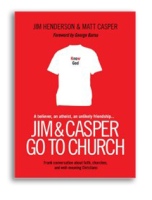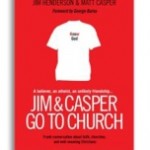 I recently read Jim & Casper Go to Church by Jim Henderson and Matt Casper. Not only did I thoroughly enjoy the book, but I also appreciate the various blogs managed by Helen (see chapter 5 in the book) over at Off The Map. Go check them out.
I recently read Jim & Casper Go to Church by Jim Henderson and Matt Casper. Not only did I thoroughly enjoy the book, but I also appreciate the various blogs managed by Helen (see chapter 5 in the book) over at Off The Map. Go check them out.
The set up for the book is that Jim Henderson “rented the soul” of Matt Casper on EBay for $504. Jim took Matt to several churches around the country to see what Matt thought of Christianity and the way we “do church.” The book records what happened.
Encouraging Things about Jim & Casper Go to Church
The two main things I took away from this book is that there is incredible value in (1) visiting other churches, and (2) inviting (or hiring) people who don’t believe the way we do to come and brutally critique our churches. Doing these two things would probably change the way most of us do church, and for the better. (As a side note, check out what LeadershipNow says about why businesses should hire “Insultants.” The same thing applies to churches.)
What I found most encouraging about the book is that Matt Casper, the Atheist, had many of the same critiques of modern “churchianity” as I do. Since I want to embrace and engage people just like Matt Casper, it was encouraging to see that in some ways, I am on the right track. His concerns about what is going on in the churches he visited with Jim are similar to many of the concerns I have.
Challenging Things about Jim & Casper Go to Church
The most challenging aspect of the book is how Jim, the Christian, rarely tried to correct or fix Casper’s views. Casper, as an “outsider” really did misunderstand what some churches were doing and why. I sometimes found myself thinking, “Why doesn’t Jim explain that to Casper?”
But at the end of the book (pp. 149-150), Jim explains why he didn’t.
There are three basic reasons: First, when people visit a church, they generally don’t have someone there to answer their questions and refute their misconceptions. Second, most Christians in the pews wouldn’t know how to respond to Casper anyway. Third, most of us Christians are too defensive and argumentative toward people who criticize the church. Instead of trying to develop genuine relationships with people, we most often try to win arguments. That’s no way to reach out. Rather, we should let their critiques stand, and maybe change the way we do some things.
I could go on and on about this great little book (even though there were some things I disagree with). Let me just give you a few of the best quotes:
Jim: “A while back (1,700 years to be exact) the church drifted into the religion business. I call it beliefism — the worship of the right beliefs — and what you’re hearing today is a version of beliefism. Rather than Christians giving priority to what we do, we’ve been taught a view that tells us what’s really important to be known for is what we believe” (p. 7).
Casper: “Is that what Jesus told you guys to do? Put on a Christian rock show that’s visually and sonically indistinguishable from a non-Christian rock show, change the words, and call it church? Is that pulled from the Bible?” (p. 18; cf. similar statements on pp. 39, 67).
Casper: “Outreach only lasts so long. The first step is always pretty good, polite outreach: ‘Would you like to come check out our church?’ Then it’s ratcheted up a notch: ‘Have you thought about where you’ll spend eternity?’ And then, they throw in the towel: ‘Have fun in hell, sinner!’ Maybe I’m exaggerating, but you get my drift” (p. 95).
Casper: “I understand that Christians believe Jesus was free of sin, but my impression is that he didn’t focus on that. He wasn’t like, ‘Look at me! No sin at all! Be just like me!’ Based on what I’ve read, his main thing was going out and helping the poor and those who were suffering, and instructing others to do the same” (p. 100).
Casper (note this from an Atheist!): “If the Bible is really the Word of God, it’s very, very important to not take it out of context. I mean, that’s the rule that applies to most every phrase ever said, so you’d think it’d apply tenfold to the Bible! …You can’t take a snippet of the Bible out of context and misuse it, or spin it, to support your particular pitch. That’s twisted” (p. 141).
The book abounds with such insights from an Atheist. I recommend reading it, and then going out and finding an Atheist or two to come visit your church and tell you what he or she thinks. Tell them to be brutal.
Then, when they are brutal, don’t try to defend yourself. Just listen. Whatever you do, don’t do this as some sort of marketing pitch to get Atheists to attend your church. That’s just dishonest. Be genuine. Be real. Just try to make friends. And if you can’t make friends with atheists, I suggest shutting down your church because you’re not doing anybody any good.




“And if you can’t do that, I suggest shutting down your church because you’re not doing anybody any good.”
Boy, is THAT going to piss some people off.
Jeremy, thanks for the mention!
I’m glad you found Jim and Casper go to Church helpful and encouraging.
About Jim not answering Casper: a lot of approaches to evangelism focus on what to answer or tell someone who isn’t a Christian. Jim’s focuses on listening.
People really like it when others listen. They often care more about that than what answers others give.
Helen,
I will be reading Jim’s Evangelism without the Additives soon. It looks helpful as well.
Yes, I think you’ll like that book too.